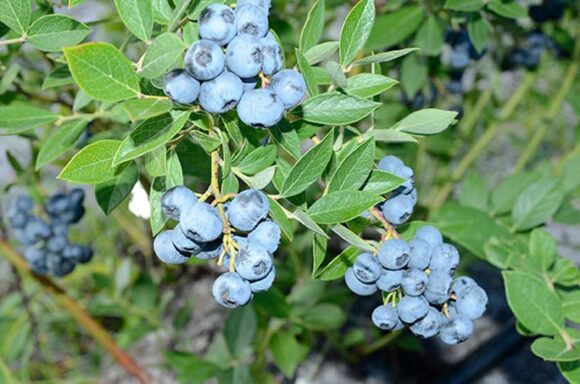 Not only is the Highbush Blueberry the state fruit of New Jersey, but this crop is also inextricably linked to Rutgers University. As we celebrate National Blueberry Month in July, we remember the early history of blueberry research and highlight Rutgers’ current research efforts to support New Jersey farmers and help sustain this agriculturally important, high-value crop. New Jersey annually ranks in the top six blueberry producers in the U.S., and in 2021, blueberries in New Jersey had a production value of $78 million. From research in new blueberry varieties to successful methods of pest control, Rutgers has been instrumental in the success of this quintessential New Jersey crop.
Not only is the Highbush Blueberry the state fruit of New Jersey, but this crop is also inextricably linked to Rutgers University. As we celebrate National Blueberry Month in July, we remember the early history of blueberry research and highlight Rutgers’ current research efforts to support New Jersey farmers and help sustain this agriculturally important, high-value crop. New Jersey annually ranks in the top six blueberry producers in the U.S., and in 2021, blueberries in New Jersey had a production value of $78 million. From research in new blueberry varieties to successful methods of pest control, Rutgers has been instrumental in the success of this quintessential New Jersey crop.
The Rutgers Blueberry Working Group continues to forge ahead in commercial and research projects in New Jersey and beyond. The group just completed multiple presentations in July at the North American Blueberry Research and Extension Workers Conference held in British Columbia, sharing valuable information for producers, researchers and consumers.
Entomologist Dr. Cesar Rodriguez-Saona, who has been targeting key blueberry insect pests, such as Spotted Wing Drosophila, Blueberry Maggot and Oriental Beetle, summarized his work in his presentation, “Challenges and Successes in Management,” with novel, research-driven strategies.
Pathologist Dr. Peter Oudemans, director of the Philip E. Marucci Center for Blueberry and Cranberry Research, spoke on Bioassays for directed bioassay screening for new fungicides against anthracnose disease. Oudemans handles state recommendations regarding fungus, virus and bacterial issues for NJ growers. Meanwhile NJAES IPM leader Dean Polk and associate Carrie Mansue are scouting the majority of NJ blueberry acreage to evaluate the current threats to the crop and commercial control plans. In association, Dr. Gary Pavlis is providing 30 years of boots-on-the-ground advice to the NJ blueberry growers and industry with a renewed emphasis on biological soil health to maintain high quality and yields.
The Rutgers-based USDA-ARS team of Dr. Mark Ehlenfeldt and Jim Polashock, respectively, presented at the recent conference on the breeding potential of new Vaccinium crops, including pink blueberries, and molecular sequencing for identification of blueberry stem pathogens.
Dr. Bill Sciarappa introduced two valuable tools to the Canadian group, namely the Solvita Soil Health CO2 burst system for assessing beneficial microbial populations in the soil and the Chlorophyll Concentration meter to assess foliar efficiency in producing healthy fruit and foliage. He also spoke of his long-term work with organic and containerized blueberries, which include USAID research in South Africa, research at Rutgers Specialty Crop Research and Extension Center, NY City rooftop projects and his work with a 10-acre commercial farm in Ocean County. This innovative farm, FullBlue360, has borne fruit with a major state grant approved for NJ blueberry farmer-owners, who will initiate the $2.4 million grant on Newark, NJ, rooftops with the continuing technical support of our Rutgers NJAES Blueberry Working Group, the Marucci Center, and Rutgers Soil Testing Lab directed by Dr Stephanie Murphy.

